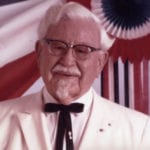 History
History  History
History  Health
Health 10 Everyday Activities That Secretly Alter Consciousness
 History
History Top 10 Historical Disasters Caused by Someone Calling in Sick
 Animals
Animals 10 New Shark Secrets That Recently Dropped
 Movies and TV
Movies and TV 10 Forgotten Realities of Early Live Television Broadcasts
 Technology
Technology 10 Stopgap Technologies That Became Industry Standards
 Weird Stuff
Weird Stuff 10 Wild Facts About Taxidermy That You Probably Didn’t Know
 Travel
Travel 10 Beautiful Travel Destinations (That Will Kill You)
 Miscellaneous
Miscellaneous 10 Modern Marriage Rituals Born from Corporate Branding
 Weird Stuff
Weird Stuff Ten Bizarre Visions of 2026 from Fiction
 History
History 10 “Modern” Problems with Surprising Historical Analogs
 Health
Health 10 Everyday Activities That Secretly Alter Consciousness
 History
History Top 10 Historical Disasters Caused by Someone Calling in Sick
Who's Behind Listverse?

Jamie Frater
Head Editor
Jamie founded Listverse due to an insatiable desire to share fascinating, obscure, and bizarre facts. He has been a guest speaker on numerous national radio and television stations and is a five time published author.
More About Us Animals
Animals 10 New Shark Secrets That Recently Dropped
 Movies and TV
Movies and TV 10 Forgotten Realities of Early Live Television Broadcasts
 Technology
Technology 10 Stopgap Technologies That Became Industry Standards
 Weird Stuff
Weird Stuff 10 Wild Facts About Taxidermy That You Probably Didn’t Know
 Travel
Travel 10 Beautiful Travel Destinations (That Will Kill You)
 Miscellaneous
Miscellaneous 10 Modern Marriage Rituals Born from Corporate Branding
 Weird Stuff
Weird Stuff Ten Bizarre Visions of 2026 from Fiction
10 Writers Who Suffered Strange and Unusual Deaths
Authors use their skills to investigate the world around them and the people that populate it. That includes their deaths. Many fiction authors have doled out extraordinary demises to their characters, but sometimes fact is stranger than fiction. While writing my book Strange Ways to Die in History, I found that many authors themselves have died in unusual and often darkly comic ways.
It is unfortunate, then, that these writers were not around to document their own weird deaths.
Related: Ten Famous Writers Who Have Mysteriously Disappeared
10 Aeschylus
Aeschylus was one of the most celebrated playwrights of ancient Athens. His tragedies won huge numbers of awards when they were entered into the competitions at the city’s festivals. For centuries, his plays were quoted and used as models for what a dignified dramatic work should be. His death, when it came, was anything but dignified.
According to ancient historians, the final plays Aeschylus put on did not meet the approval of the Athenian crowd. Annoyed that they no longer appreciated him, the great writer left Athens and moved to a Greek colony in Sicily. It was there he met his fate—or rather, his fate met him.
A prophecy had informed Aeschylus that on a certain day, a house would fall on him. So he did the obvious thing and decided to spend the entire day outside. If he wasn’t in a house, then how could one fall on him? A passing eagle had different ideas. Eagles in that part of Sicily carry tortoises high into the air and drop them on rocks to break them open, and this one mistook Aeschylus’ bald head for such a rock. The tortoise landed on him and killed him. It was the tortoise’s house he should have watched out for.[1]
9 Georgi Markov
Georgi Markov was taking a stroll to work in London in 1978 when he felt something jab the back of his thigh. As he turned around to see what happened, he noticed a man behind him had dropped his umbrella. The man apologized and hopped in a taxi that drove away. Markov continued about his day and did not think much of it. He did tell his colleagues about what had happened because there was still pain in his leg, and a lump was forming there. Markov did not know that he had already been killed.
Markov was in London because he had become an anti-communist dissident under suspicion by the government in his native Bulgaria. When he did not return to Bulgaria from a stay in the West, Markov’s books were pulled from shelves, and he became a non-person. But not “non” enough for the Bulgarian secret service. Markov had started working with the BBC and was producing more anti-communist works. They decided to silence him.
Four days after the incident with the umbrella, Markov was dead. During the autopsy, a small pellet made of platinum and the size of the head of a pin was discovered where he had been struck. Two small holes had been drilled in it, and the powerful poison ricin inserted. It seems that an umbrella gun was used to shoot the pellet into Markov. No one was ever charged with the murder.[2]
8 Thomas Urquhart

Sir Thomas Urquhart is one of the most singular figures in Scottish literary history. He was either a genius or a madman. His works contain epigrams, a new method of learning trigonometry that is written in gibberish, a complete history of his genealogy back to the Garden of Eden, and a constructed language he claimed to be perfect. It may be that many of these were parodies, as they tend to include attacks on his enemies and many creditors.
Urquhart became unstuck when he fought with Charles II at the Battle of Worcester in 1651 in hopes of restoring the monarch to the throne of England. The royal forces lost, and Urquhart was captured and placed in the Tower of London. It is said that when Charles II was finally restored in 1660, the news so pleased Sir Thomas that he had a fit of laughter that killed him.[3]
7 Saki
Hector Hugo Munro, better known by his pen name Saki, was one of the greatest short story writers of the early 20th century. His witty tales are little gems. In just a few pages, he conjures up vivid images of the Edwardian period and then uses unrivaled humor to pierce all the pretensions of the age.
When World War I broke out, Munro decided to sign up for the army despite the fact that he was too old. He even refused to be commissioned as an officer because he wanted to serve on the front lines. It was in the trenches that he met his end. There was a superstition at the time that soldiers should never light three cigarettes using the same match because it would draw the attention of a sniper, and the third man would be struck.
As it so happens, it was a cigarette that caused his death in the end. One night, while on duty, he saw a man openly smoking and barked, “Put that bloody cigarette out!” at him. At that moment, a sniper’s bullet hit Munro, and he dropped dead. Smoking is bad for the health.[4]
6 Molière
So influential was the 17th-century French playwright Molière that the French language has been described as Molière’s language. His comedies are still regularly performed on the stage. Molière’s plays satirized not only the society he saw around him but also all human vices. Not everyone was a fan—the Catholic Church tried to ban his play Tartuffe because it showed the effects of false piety. The royal family were fans of his work, though, so Molière was soon back on the stage.
Molière’s health in the final years of his life was not good; he had developed TB. But he still decided to perform in his latest work titled The Imaginary Invalid about a hypochondriac who always thinks he is ill. Molière often seemed to mock his own literary efforts. In this play, he acted as a character who said, ‘Your Molière’s an impertinent fellow… If I were a doctor, I’d have my revenge… when he fell ill, I’d let him die without helping him. I’d say: ‘Go on, drop dead!”‘
On the fourth night of the performance, Molière coughed up blood and collapsed on stage but insisted on finishing the show. However, it was too much for him, and he died a few hours later. Molière’s illness was anything but imaginary.[5]
5 Boethius
Anicius Manlius Severinus Boethius, commonly just called Boethius, was a writer, philosopher, and politician in Rome in the early 6th century, just after the collapse of the Western Roman Empire. He served under the Ostrogothic kings who had taken over Italy at this time and rose to the heights of power. Maybe too high. In politics at the time, if you fell from the top, you fell all the way.
Boethius was accused of a treasonous relationship with the emperor of the Eastern Roman Empire in Constantinople. He was arrested and thrown into prison. While there, he used his time to continue writing, producing The Consolation of Philosophy about how philosophers should deal with misfortune. Boethius would soon have to test his theories.
We know that Boethius was definitely executed, but the details are recorded in different ways. According to some, he had his head cut off, while others say he was hanged. The most lurid account says that a rope was tied around Boethius’s skull and twisted so that it slowly tightened, and his eyes were forced from his head. Some say he was then mercifully beaten to death with clubs.[6]
4 Nikolai Gogol
Nikolai Gogol was a playwright, novelist, and master of the short story. His tales like “The Nose,” “Diary of a Madman,” and “The Overcoat” reflect Russian society in the 19th century. Gogol was credited as influencing a huge number of the authors who came after him—one even commented, “We all came out from under Gogol’s overcoat.”
Gogol’s novel Dead Souls cemented his position in the literary world, and it was just the first part of a masterpiece he was planning. Unfortunately, he fell under the influence of a strict priest called Matvei Konstantinovsky, who managed to convince him that all works of fiction sprang from the Devil. Gogol burned the manuscript for the second part of Dead Souls.
Gogol then swore off food in preparation for a religious festival, and the lack of food broke his health. Doctors who attempted to help him attached leeches to his nose, put him in scalding baths, and tossed ice water over his head. Somehow, this did not cure Gogol, and he soon died.[7]
3 Margaret Wise Brown
The books we read as children tend to stay with us for life. Margaret Wise Brown shaped the lives of millions with the hundred books that she wrote, including classics like Goodbye Moon and The Runaway Bunny.
Sadly, Brown’s life ended with a dramatic flair aged just 42. She was touring Europe when she fell ill with appendicitis and had to have an operation. While recovering in the hospital, Brown decided to show one of the nuns caring for her just how well she was feeling. With a flourish, she did a high kick. Unfortunately, this movement dislodged a blood clot that traveled to her heart and killed her.[8]
2 Yukio Mishima
Yukio Mishima was many things in his life. For his novels, he was nominated for the Nobel Prize. But he was also a playwright, poet, actor, model, and founder of a militia known as the Shield Society. It was this final role that led to Mishima’s death.
The Shield Society was formed in 1968 when Mishima became alarmed by the rise of left-wing politics in Japan. He gathered a group of nationalists and anti-communists and gave them strenuous exercises to perform to increase their strength. Oddly, the members of the group were allowed to train alongside those of the Japanese Self Defense Force.
In 1970, Mishima and four members of the society took over the headquarters of a military base and tied up the commander. He then stepped onto a balcony and delivered a speech, hoping to rouse the soldiers to launch a coup that would hand sweeping powers back to the emperor. Instead of support, the soldiers jeered him. Mishima retired back inside and told those with him, “I don’t think they heard me.”
The author then committed suicide by seppuku—ritual disembowelment. As is traditional, Mishima had a second who was expected to behead him afterward, but three attempts to cut off Mishima’s head failed, and another had to step in to finish the task.[9]
1 Francis Bacon
Francis Bacon served as Lord High Chancellor under King James I in the 17th century but is better known for his philosophical works, which paved the way for the scientific revolution. His idea was that theories should be tested by experimentation, but it was an experiment that proved his undoing.
While out for a ride on a snowy day, Bacon and a friend were discussing how food could be preserved for a long time. Thinking that cold might do the trick, Bacon rushed out and bought a chicken, which he then stuffed with snow. The philosopher declared that the experiment had worked marvelously well—in a letter that he dictated from his deathbed.
Bacon caught a chill from his exertions, and his earliest biographers linked this to his death soon afterward from pneumonia. Certainly, being placed in a cold and damp bed to recover from the chill did not help him. The ghost of a chicken is said to still haunt the site of this first experiment in frozen food.[10]








